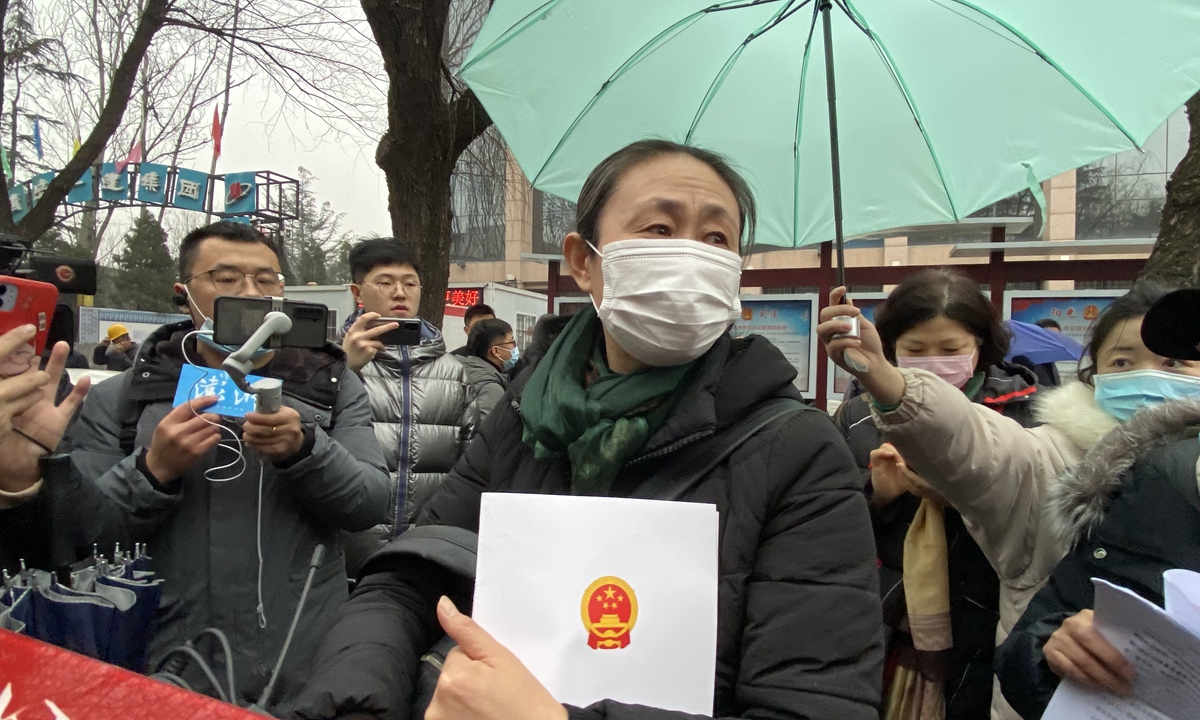Jiang Ge case verdict upholds essence of trust, goodness with fairness and justice

Photo: CFP
On January 10, 2022, a court in Qingdao of East China's Shandong Province gave the verdict on the case of Jiang Ge, a Chinese student who was fatally stabbed in Japan more than five years ago. The trial also received much attention in the international community. Some foreign media even reported about the media briefing held the next day by Jiang Qiulian, the mother of Jiang Ge in the "Breaking New" section. It is reported that Jiang Qiulian communicated with judges of the Beijing Internet Court on January 12 as she also filed a civil lawsuit against people who openly defamed Jiang Ge on the internet.The rule of law is an important achievement of humanity's political civilization and is a basic means of governance in modern society. From the first trial of this case, people can feel a clear value orientation of protecting morality and justice with the law. Some foreign media outlets pointed out that Chinese legal experts widely held that the conclusion of Jiang Qiulian suing Liu Nuanxi is a ruling concerning morality and justice and the judges should have a deep understanding and grasp of mainstream value and morality orientation in society.
The verdict emphasized that helping the poor and supporting the needy is a traditional virtue of the Chinese nation. Honesty, trust, friendliness and kindness are important content of core socialist values. The judicial ruling should safeguard moral bottom line of a society, advocate virtue and righteous conduct and guide the whole society to respect morality and goodness.
The words have highlighted China's spirit of the rule of law and proved the belief that we should wield the sword of law, hold the balance of justice, eliminate the evil in the world,and keep the purity of politics and law.
Jiang Ge was fatally stabbed in Japan in 2016 and the murderer Chen Shifeng was sentenced to 20 years in prison for intentional homicide and intimidation in Japan in 2017. Although the ruling has its own legal justification in Japan, it's undoubtedly a disappointing ruling for tens of thousands of people who signed an online petition in support of Jiang Qiulian and demanded death sentence for the murderer. Many people still hope that the rule of law can give more support to morality and justice with a higher standard.
It must be said that people from different cultural backgrounds have different understanding of the law. China's traditional rule of law culture, in its long history, advocated punishing evil and promoting kindness while prudently implementing laws and regulations. The tradition emphasized winning the trust of the people, using laws to rectify and discipline and seeking great governance. In European countries and the US, many court buildings are decorated with the sculpture of Justitia, the Lady Justice. It's the result of the revival of ancient Greek and Roman art and the revival of Roman law in the era of Renaissance. The goddess holds a balance in one hand, representing "fairness," and sword in another, representing "justice." Being blindfolded signifies observing with the heart.
Some commentators have pointed out that the "justice" emphasized by Western cultural traditions is more reflected in judicial judges being "blindfolded", who rely on their inner conscience to use "balances" to measure the right and wrong of both parties in a lawsuit and express their pursuit of judicial truth. The Chinese cultural tradition, on the other hand, pays more attention to the justice and fairness of judges, requiring judicial officials to see everything clearly so that the objective truth can be revealed to the world. This reflects the pursuit of objective truth.
It is worth emphasizing that upholding fairness and justice is always the hope of the people, and it is inseparable from the practical actions jointly supported by the rule of law and the rule of virtue.
The reason why a paragraph of the first trial verdict of the Jiang Ge case deeply touched people's hearts is that it reflects the value orientation of both the rule of law and the rule of virtue. "As a female student studying in a foreign country, Jiang Ge offered a helping hand to her compatriot who was in trouble, provided sincere care and help, and was hurt and lost her life. Her selfless act of helping others reflects the traditional virtues of the Chinese nation, which are in line with the core socialist values and public order and good customs and should be praised. She shall be given legal remedies as she was hurt. As Jiang Ge's good friend and the one being rescued, Liu Nuanxi, after the incident, did not feel grateful and offer compassion and comfort to the relatives of the deceased, but instead used inappropriate words to further aggravate the pain of others. Her acts violated common sense and should be condemned. She shall bear civil compensation liability and bear all the case handling fees."
The balance and the sword are also the power to awaken honesty and friendliness. With the light of the socialist core values, the humanistic heritage can be accumulated and the civilization of the rule of law can be promoted, which is the good fortune of the people.
Today's China pays attention to strictly abiding by laws and regulations and protecting the common people. It also attaches importance to reminding society of the achievements of improving the quality of the rule of law and morality. China adheres to the combination of the rule of law and the rule of virtue, integrates the socialist core values into the construction of the rule of law, improves the long-term mechanism for trust-building, increases the punishment for behavior such as anomie of public morality and lack of credibility, and strives to form good social customs and social order. As the ancient saying goes, driving the people of the world to do good and stay away from sin is the measure of the criminal law and the reason for the success of education.
The author is a commentator with the Global Times. opinion@globaltimes.com.cn


